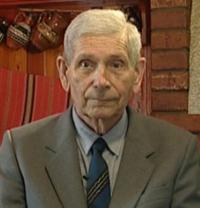“A man could only hardly imagine that the things they did and they were able to do were real.”

Download image
Michal Popovec was born on February 6, 1931, in the village of Dubová in a peasant family. After gaining the primary education at a public school and one-year complementary course, he started to attend the grammar school which he did not finish due to unforeseen circumstances. On May 2, 1949, he was arrested along with other seven students. They were all suspected of sabotaging First of May celebration because of explosion of the bridge between the village Mokroluh and the city Bardejov that happened during the night from April 30 to May 1, 1949. After spending three days in custody, their innocence was proven and they were released. Ján Šimko, his brother-in-law, introduced him Ján Berežný, who had come from American zone in Austria. He was looking for a purchaser of penicillin, because there was a shortage of this remedy back then. Besides the arrangement of meeting with doctor Valér Baráč, they helped him to organise a group of boys who decided to flee to Austria and America to work there. While crossing the border between Russian and American zone in Austria they were arrested by Russian soldiers. When being investigated and tortured inhumanly, they revealed identity of all the people who had helped them to flee, including Michal Popovec and his relatives. Two weeks later, on June 14, 1949, he was arrested together with his father, brother, brother-in-law and some other people by the State Security members. Doctor Valér Baráč was sent to prison as well. After more than two weeks of torture in Prešov, on July 2, 1949, they were transported to a County Prison in Bratislava. Michal Popovec was sentenced by the County Court in Bratislava to four years of imprisonment, a 10 000 crowns fine and confiscation of his property. The whole family fortune, including factories producing cloth and coal as well as a factory processing codfish, was seized by the government. Moreover, he lost his civil rights for five years and the right to vote for three years. He served his sentence subsequently in Leopoldov and Jáchymov. At Christmas in 1949 and on New Year’s Day in 1950 he attended masses in Leopoldov chapel, which had to be demolished by priests themselves a few months later. Even after his release he was constantly monitored by the State Security. In spite of his misfortune, he passed the leaving examination at a secondary school in Bratislava. Moreover, in Bardejov he attended complementary study which he successfully finished two years later. Firstly, he worked as a building technician in the company Pozemné stavby in Prešov and later in Bardejov, where he worked until his retirement. Along with his wife Terézia he brought up three children - a son and two daughters.
